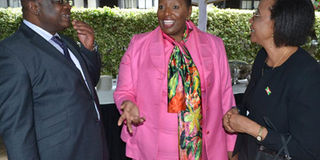Envoy apologises over South Africa's xenophobic violence

South Africa High Commissioner to Kenya Koleka Mqulwana (centre) with Burundi Ambassador to Kenya Beatrice Kankindi (right) and Ambassador of the Republic of Congo to Kenya Jean Pierre Ossey during the celebration of South Africa Freedom day held at Southern Sun Hotel in Nairobi on May 27, 2015. PHOTO | JEFF ANGOTE | NATION MEDIA GROUP
What you need to know:
- Ms Mqulwana tendered the apology just a month after President Jacob Zuma accused other African countries of contributing to xenophobia.
- The South African envoy paid tribute to the contribution of African countries in liberating her country from apartheid.
- President Zuma has since convened a committee on migration in what his government says is a bid “to explore long-term solution to deal with issues of integration.”
The South African envoy in Nairobi has apologised for the xenophobic violence that rocked his country in April but called on the continent to “overcome” the challenge of migration.
At a function in Nairobi, the new South African High Commissioner Koleka Anita Mqulwana told a gathering that despite the violence, her country was still a better place for African immigrants to live.
“These attacks happened in my country and for that, I owe the African continent and the global community an apology.
“Our government condemns in the strongest terms the acts of violence that affected our brothers and sisters,” she said, during delayed celebrations for the country’s Freedom Day.
“In 1994, South Africa took a decision to integrate refugees into our communities instead of putting them in camps. One lesson we have learnt is that integration is a challenge requiring constant attention,” she argued, insisting that 14 per cent of South Africa’s 50 million people are immigrants.
Ms Mqulwana tendered the apology just a month after President Jacob Zuma accused other African countries of contributing to xenophobia by influencing migration out of their territories.
At least 10 people were killed when frustrated jobless mobs of youth targeted African migrants in the KwaZulu-Natal provincial capital of Durban from late March.
The violence, thought to have been incited by an influential Zulu King, later spread inwards to Johannesburg as thousands of migrants fled to camps.
EVACUATING NATIONALS
Some neighbouring countries reacted by evacuating their nationals while Nigeria recalled its envoy from Pretoria.
The South African envoy paid tribute to the contribution of African countries in liberating her country from apartheid.
However, South Africa still stands accused of mistreating other Africans though stringent immigration rules.
Kenya, for instance, allows South Africans to get visas at ports of entry yet Kenyans must apply for visas before they enter South Africa.
In fact, Kenyans must now pay at least Sh6,000 in visa processing fees even though the visa itself is said to be free.
Last week, the two countries announced they were holding discussions to establish a Joint Commission for Cooperation to address immigration rules.
“South African-Kenyan relations are reinforced by people-to-people diplomacy. We will continue to engage with the relevant stakeholders, from the Foreign Ministry, South African community, academia, the business community and the health sector among others to ensure ease of movement to South Africa within our regulations” she said.
“We would especially like to see more exchanges in the areas of education and health.
LUKEWARM ENGAGEMENTS
Next month, South Africa is expected to host the 25th Ordinary Summit of the African Union but it had been feared xenophobic attacks could fuel lukewarm engagements.
President Zuma has since convened a committee on migration in what his government says is a bid “to explore long-term solution to deal with issues of integration.”
There were initial reports that a Kenyan had been killed too although Kenya’s mission in South Africa later clarified the Kenyan’s death was unrelated to xenophobia.
“As much as we have a problem that is alleged to be xenophobic, our sister countries contribute to this. Why are their citizens not in their countries and are in South Africa?” he told a gathering last month in South Africa.
“The latest outbreak of violence necessitates more comprehensive action from all of us to ensure that there is no recurrence. We have to address the underlying causes of the violence and tensions, which is the legacy of poverty, unemployment and inequality in our country and our continent and the competition for limited resources.”
“International migration and its roots causes is the challenge we must overcome in this century. African should not be travelling miles and miles sometimes by foot, across deserts and sea, often at great risk, just to put bread on the table.”





